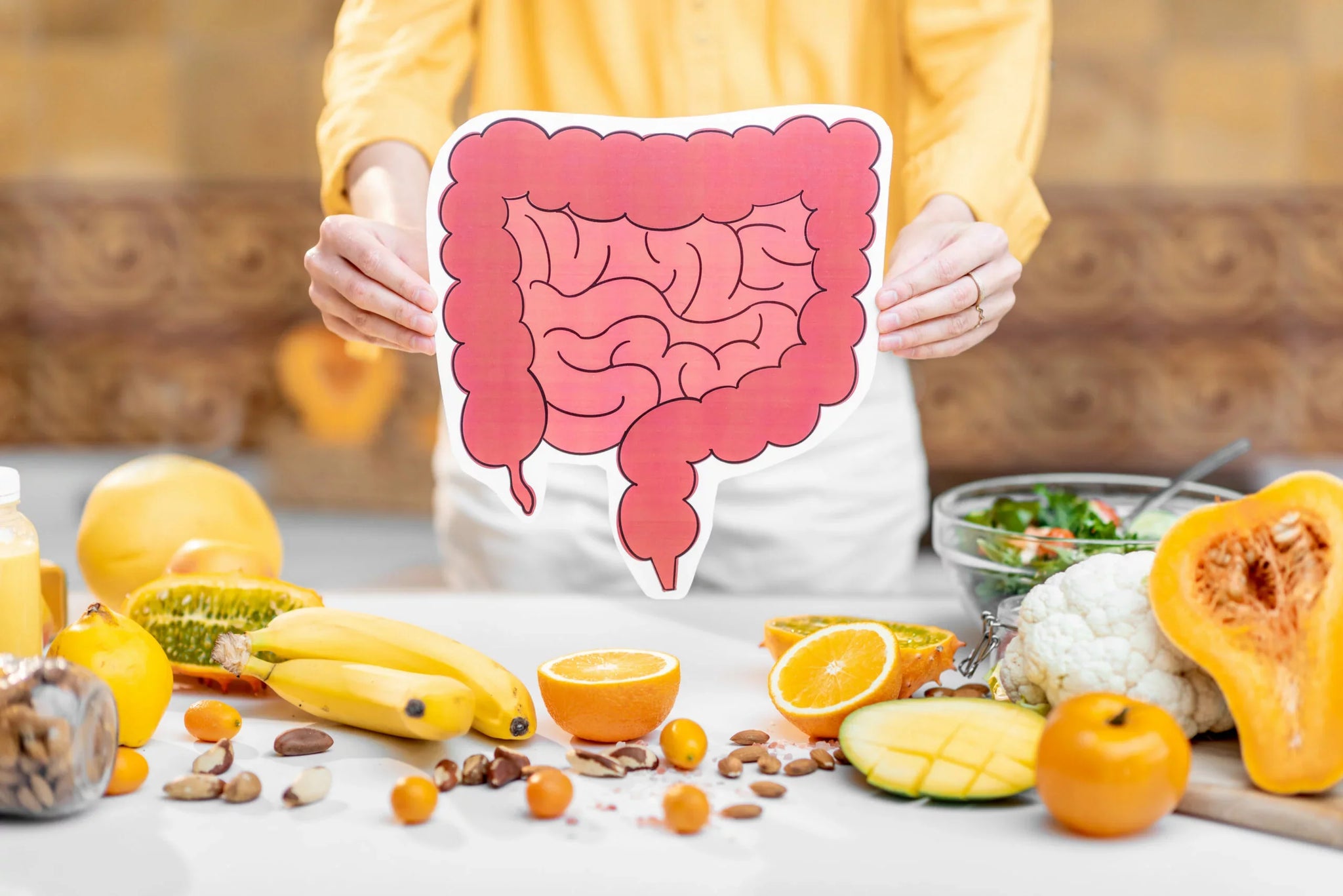What is the Gut-Brain Axis and How Does it Influence Immunity?

Did you know one of the keys to a healthy immune system is in your gut…or is it your brain? This week we’re talking about the gut-brain axis.
If you’ve ever noticed digestive issues from stress or ever had a good old-fashioned “gut feeling,” you’ve experienced it first-hand. The gut-brain axis is the relationship between your digestive system and your brain, and it turns out they have a lot to say to each other. One of their favorite topics of conversation just happens to be your immune system.
Read on to discover exactly what the gut-brain axis is, how beta-glucan can support immunity and digestion, and the surprising ways your gut influences your immune system.
Table of Contents
- What is the gut-brain axis?
- How are the gut and brain connected?
- What is the microbiome?
- How does gut health effect the immune system?
- What factors may negatively impact gut health?
- How to use your gut-brain axis for stronger immunity.
- Can beta-glucan promote a healthy microbiome?
- Heal your gut and strengthen immunity with beta-glucan.
What is the Gut-Brain Axis?
Well, it’s complicated. It’s one of the most powerful examples of how our physical and mental health are connected. Additionally, it has a major impact on immune health.
During the 60s and 70s, scientists began noticing similar peptides (two or more amino acids linked in a chain) in the brain and the gastrointestinal tract. This is when the term “gut-brain axis” started being used, but it was hardly the first time anyone noticed a connection between our minds and stomachs.
But how exactly are the gut and brain connected? And what do they have to do with the immune system? Don’t worry, we’re getting there.
How Are the Gut and Brain Connected?
The connection between your gut and brain is bi-directional. That means your brain can influence your gut, but your gut can also influence your brain. It involves your central nervous system (CNS), enteric nervous system (ENS), and autonomic nervous system (ANS). What complicates matters even further is that the exact pathway of communication is still up for debate. See now why it’s so complex? Now, let us simplify it for you…
If you’ve ever experienced butterflies in your stomach, this is the gut-brain axis in action. Usually, people notice this fluttering, nauseating feeling when they’re nervous or stressed. You might experience this sensation before giving a big speech or going on a date. That means your mental state is influencing your physical state.
More specifically, it likely means your limbic system (which influences emotional and behavioral responses) triggered other aspects of your ANS (heart rate, respiration, digestion, etc.). When we feel stressed, the fight-or-flight component of the ANS can kick on. This causes adrenaline and glucose to be released, and blood is redirected towards your limbs to prepare your body to fight or flee. All of these changes cause a shortage of blood in your gut that ends up impacting the ENS.
The ENS is comprised of two layers and over 100 million nerves that line everything from your rectum to your esophagus. All of the bodily changes that occur during fight-or-flight impact your ENS. So, when you’re stressed or anxious, those “butterflies” are your ENS responding to the lack of blood flow.
The above example illustrates how your emotions can influence your gut, but it works both ways. For example, those with certain digestive issues are more prone to anxiety. However, you don’t have to have digestive issues for your gut to influence your mood. In the end, your gut-brain axis relies quite a bit on the health of your microbiome. And the more balanced your microbiome, the stronger your immune system!
What is the Microbiome?
The microbiome refers to the various microbes that exist throughout the body. While that sounds scary, it’s actually an essential aspect of human development, immunity, and nutrition. Some of the microbes in your gut (like Lactobacilli) are extremely beneficial. However, bacteria like E. coli are obviously harmful and can lead to serious medical issues.
Overall, a healthy microbiome requires diversity. According to Gastroenterology & Hepatology, a microbiome with a variety of good bacteria will promote healthy immune function, improve feelings of depression, and a variety of other benefits.
When your microbiome isn’t balanced, however, you may experience stomach disturbances, weight changes, fatigue, sleep disturbances, skin irritations, and more. For example, serotonin (a neurotransmitter that influences mood and sleep/wake cycles) is produced primarily in the gut. So, if your microbiome starts impacting serotonin production, you may experience sleep loss, restlessness, affective disorders, and more.
There are even several medical conditions associated with microbiome issues. Conditions like inflammatory bowel disease (IBD) and irritable bowel syndrome (IBS) have been linked to microbiome imbalances.
What we’re seeing more and more, is that everything is connected. Your thoughts and emotions impact your physical body and the way it’s able to interact with the world around you. Perhaps one of the best examples of this is how your gut health affects your immune system.
How Does Gut Health Affect The Immune System?
Things like stress, dehydration, and lack of sleep can quickly have a negative effect on immunity. But a strong immune system also depends on your gut. The interaction between your immune system and bacteria is one of the pivotal factors in overall immune health. That means your microbiome plays a big role in immunity.
The immune system acts like your body’s security department. It identifies and responds to threats. When it identifies a new threat, it develops a specific response that it’ll remember and use in the future. So, a more diverse microbiome will encourage your immune system to identify many different “threats.”
As we age and encounter new microbes, the way our gut responds to them modulates brain development and function. A review published by Neurobiology of Disease even says gut microbiota help regulate the immune system and that changes to gut composition can lead to altered immune responses.
What Factors May Negatively Impact Gut Health?
Since the connections between gut health and immunity are so complex, a variety of factors can contribute to poor gut health.
- High sugar diet
- Low fiber diet
- Poor sleep habits
- Lack of physical activity
- Stress
- Certain prescription drugs
How To Use Your Gut-Brain Axis For Stronger Immunity
Since gut health has such a big impact on overall immunity, it’s important to promote a balanced microbiome. To help you do that, however, it helps to pay attention to how your brain and gut speak to each other. Two of the best ways to strategically use your gut-brain axis for stronger immunity are to:
- Keep a journal to track your diet, energy levels, mood, sleep, etc. This may sound like a lot of homework, but it will help you identify trends and make better lifestyle choices.
- Incorporate mindfulness into your routine. We often overlook our mental state when it comes to health, but it’s very important. Try to be more aware of your emotions so it’s easier to see how they correlate to other areas of your life.
The best way to rid your gut of bad bacteria and promote a healthier microbiome is through the foods you eat. Eating a wide variety of plants is a great way to start. If you want to improve your gut health, here are some of the best foods to incorporate into your diet:
- Green leafy vegetables
- High fiber foods rich in beta-glucan (oats, barley, etc.)
- Omega 3 Fatty Acids (salmon, tuna, flaxseed, chia seed, etc.)
- Polyphenol-rich foods (berries, green tea, cocoa, etc.)
- Fermented foods (yogurt, sauerkraut, kefir, etc.)
This isn’t a complete list by any means, but it should give you a good idea of where to start.
Can Beta-Glucan Promote a Healthy Microbiome?
If you’ve been part of the HakaLife family for a while, you may have noticed a lot of the foods we listed are rich in beta-glucan. That’s not a coincidence!
Beta-Glucan is a type of soluble fiber found in certain plants, bacteria, yeasts, and fungi. Many already consume foods with beta-glucan because they support immune function. These foods include barley, oats, mushrooms, etc., and are easy to add to your diet. Well, it turns out these foods also have massive potential when it comes to improving your overall gut health. The issue is that these foods don’t contain beta-glucan in the optimal molecular chain.
That’s why finding a high-quality supplement with Beta-Glucan 1,3/1,6-D is so important. Instead of eating your weight in oats to try and get enough beta-glucan, you can simply add a high-quality beta-glucan supplement. When extracted from specific strains of baker’s yeast, beta-glucan provides powerful immune and digestive support. That’s why Beta Glucan Supplement has 500mg of Beta-Glucan 1,3/1,6-D and a minimum of 85% purity.
Heal Your Gut and Strengthen Your Immunity with Beta-Glucan
Gut health and immunity are complicated, but simple everyday choices can make life easier. Maybe that means adjusting your diet, being more mindful, or using a high-quality beta-glucan supplement.
We’re excited to offer you a supplement that also incorporates a variety of healthy organic ingredients like echinacea, elderberry fruit powder, Vitamin C, Vitamin D, and zin.
Take charge and become a warrior for your health today.










